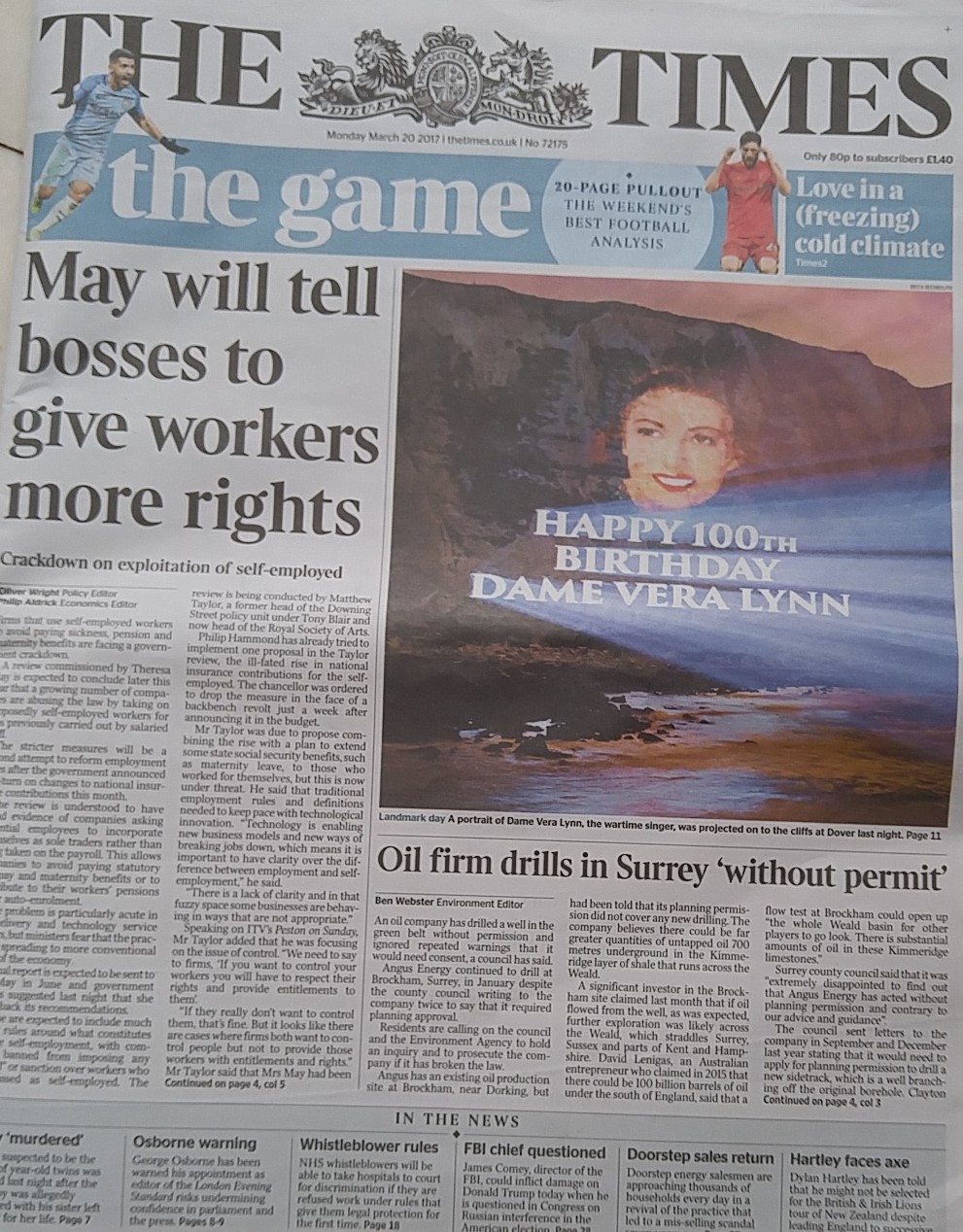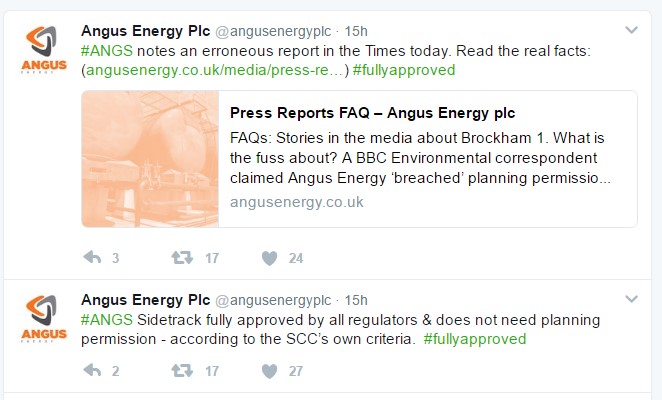
Photo: Brockham Protection Camp
Angus Energy has made a strong defence of its operations at the Brockham oil site in Surrey, saying it had all the consents it needed.
The front page of today’s Times newspaper included an article headlined “Oil firm drills in Surrey ‘without permit’”.

At 2am, Angus tweeted:
“Sidetrack fully approved by all regulators & does not need planning permission – according to the SCC’s [Surrey County Council’s] own criteria”

Angus has also posted a page on its website about press reports and Brockham. It said:
“We stand by our statement no breach has occurred.”
The website added:
“Any characterisation that Angus Energy deliberately misled its investors and the public or misunderstood clear advice is offensive, wrong and self-serving.”
Media reports over the past two weeks have raised questions about whether the company had planning permission for a side-track well, drilled at the site in January 2017.
On 9 March 2017, Surrey County Council made a statement saying it was:
“extremely disappointed to find out that Angus Energy has acted without planning permission and contrary to our advice and guidance.”
On 16 March 2017, the council said it had invited the company to apply for retrospective planning permission for the side-track (more details).
Correspondence released on 15 March 2017 under a Freedom of Information Act request showed that Surrey County Council had told Angus Energy it did not have planning consent for additional drilling at Brockham.
The Times reported this morning
“Residents are calling on the council and the Environment Agency to hold an inquiry and to prosecute the company if it has broken the law.”
But a statement on the Angus website said:
“We stand by our statements to the public, the SCC and our investors.
“We firmly believe we have acted in a professional and correct manner and followed all permissions and guidelines from the OGA, EA, HSE and the SCC. Naturally we will continue to do so.”
The website added:
“The government’s guidelines make it absolutely clear that the remit of local councils covers the surface impact of the operations including matters such as noise, visual impact and traffic movements. All of our surface work was covered by our planning permission. We work with our local council on many important surface issues that rely on their expertise and requirements.
“The sidetrack that has been drilled doesn’t fall within these circumstances and doesn’t need planning permission according to SCC’s own criteria.
“Despite having every opportunity at a number of meetings and in extensive correspondence, SCC has not identified any way in which the sidetrack causes any planning harm.”
In response to a TV news report on BBC London on 9 March, the company said:
“We believe this report was deeply flawed. It violated BBC’s own editorial guidelines. We will have more to say on this after we file our complaint with the BBC Director General and OFCOM.”
DrillOrDrop has invited Angus Energy to respond to statements by Surrey County Council and the references in the FOI correspondence on planning consent. It has not replied. Today we asked the company for an interview. We will update with any response.
Categories: Industry

Good idea to take local councils out of the planning process for matters that take place under ground. They generally seem to have a very poor understanding of the processes. Is there a new hole? There isnt. Something got stuck and they kicked off. Its not great but it is standard engineering.
See http://www.glossary.oilfield.slb.com/en/Terms/s/sidetrack.aspx
[Edited by moderator] of greater concern is what happens above ground when things go wrong.
A wasted effort when pragmatically this tiny oil 30 yr old well would continue to be better than imported oil for the environment, economy and human rights. The maintenance work has ensured it is kept in good condition.
If everything was hunky-dory we wouldn’t be having this effort to clarify the situation.
Not hunky-dory at all -protesters and company sailing close to the wind with the law.
Identifying the actual issues seems to be escaping us here, it seems that county council planning regulations only apply to the surface activity, how is the subsurface activity regulated, and by what regulatory body, and why has there been no comment on this activity from such an agency? What planning and operating regulatory permission is required below ground? Has any such regulatory requirement been applied for?
Also the abandonment bond only covers above ground work, what body regulates abandonment procedures below ground, who measures and monitors operations below ground, records accidents, mistakes, non conformity to procedures and who pays for reparation and reinstatement to a condition prior to the operation?
Gas power stations produce 120 times more methane EDF report says.
http://www.independent.co.uk/environment/gas-power-plants-methane-emissions-120-times-more-study-purdue-edf-greenhouse-global-warming-climate-a7641471.html
Another o&g industry claim bites the dust.
Phil
Not quite true I think. As is often the case, the headline is just to get you interested. What is then said does not say that all Gas fired power stations produce 120 times more methane than they report.
The report, as reported,concludes, inter alia that…
‘The climate benefit of using natural gas for electricity generation is not compromised’. So maybe the O&G industry claim has not bit the dust, but I am not sure which claim you say does. Gas better than coal, gas production methane emissions or something else.
Their conclusion is based on their measurements, meaning the plants needed to leak another 6 times more ( presumably 6 times the 120) to be as dirty as coal.
The rates were between 11 and 120 times for the three plants surveyed.
They also say this is easily remedied by the use of infra red detectors for leak detection and the use of bubble gum to fix them. Yup…really.
Lots of sexy headlines often boil down into something far more prosaic.
Just need to find the real report, rather than the media report, and see if they have got more money for further research, plus how they compare to the UK.
Well, that is not quite true either is it?
Shale gas use has been shown to be lower in CO2 emissions, but higher in releasing methane in extraction, distribution and delivery terms, it also releases other gasses, such as sulphur dioxide and radon into the atmosphere. Overall recent studies in US and Canada showed a surprising amount of methane released throughout the whole process, much higher than estimates indicated prior to the studies.
Methane has 80 times more damage to atmospheric greenhouse effects compared to CO2.
120 x 80 = 8160 times more effect per plant estimate than previously assessed compared to CO2. Not very sexy.
The results are easy to look up.
Still masticating the particulate matter I’m afraid.
It does say that exactly, does it?
As far as I’m aware leakage of methane has been steadily decreasing as awareness of the topic has increased. The vast majority of leakage occurs above ground during the distribution phase so any problems (however small they may be) are not specific to shale gas but to all forms of natural gas. In the UK much more of the distribution system runs underground (or undersea) anyway so it’s likely to be less of a problem than in the U.S.
By the way one of the posts mentions radon and that issue always fascinated me because I’m interested in the perception of risk. There are tiny amounts of radon in natural gas. Scary? I’m no expert but I read somewhere that if you live next door to a nuclear power station and heat your home with natural gas then you’re getting a bigger dose of radiation from the natural gas than from the power station. If you live in Cornwall of.course you are suffering increased exposure simply because the rocks there are more naturally radioactive. I understand there are specific building regs in the area to mitigate the effect. That doesn’t stop people flocking to the area to live and holiday (or indeed stop people heating their homes with natural gas); why not I wonder – I guess it must be something to do with the actual and/or perceived level of risk/harm. I think it’s similar questions with shale – what’s the actual risk, what’s the perceived risk, what are the actual benefits, what are the perceived benefits?
Dimension 1 Fake facts …..to…..true facts.
Dimension 2 Fake news…..to……real news.
Dimension 3 Inaccurate perceptions……to…….accurate perceptions.
Who owns the ruler, who do you trust to do the measuring?
Que bono?
True news?
True facts?
Who owns the ruler??!!
Who owns the government?
who owns the council?
Who owns democracy?
Who owns the fake media?
Inaccuracy is, deny, contradict, obfuscate and intimidate.
Looks to me like someone at Angus is an idiot.
Just like the idiot in Northern Ireland who wasted millions of public money in their renewables subsidy fiasco.
So there are idiots (my perception) on both sides of the argument.
So what body regulates, measures and records below ground activity on a day to day basis?
What regulatory body attends, monitors and reports on activities below ground.
Self regulation?
Gold standards?
Let us see that in action, evidenced anywhere, at any site, at any time since this industrialisation process began here onshore.
No? Yes? Maybe? Who is responsible?
Provide evidence please.